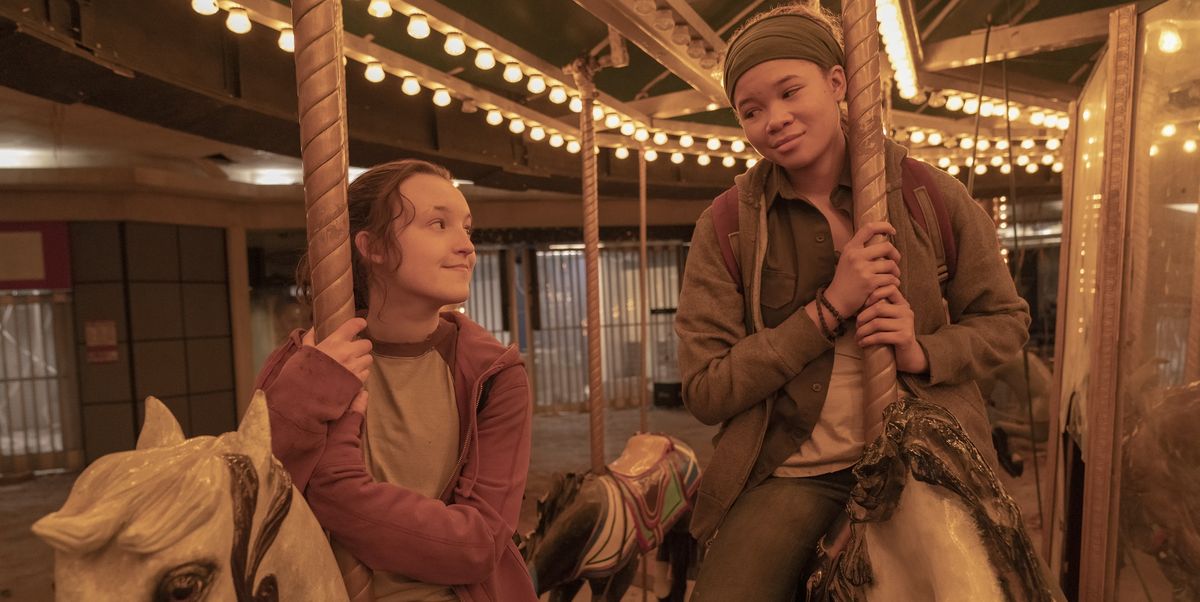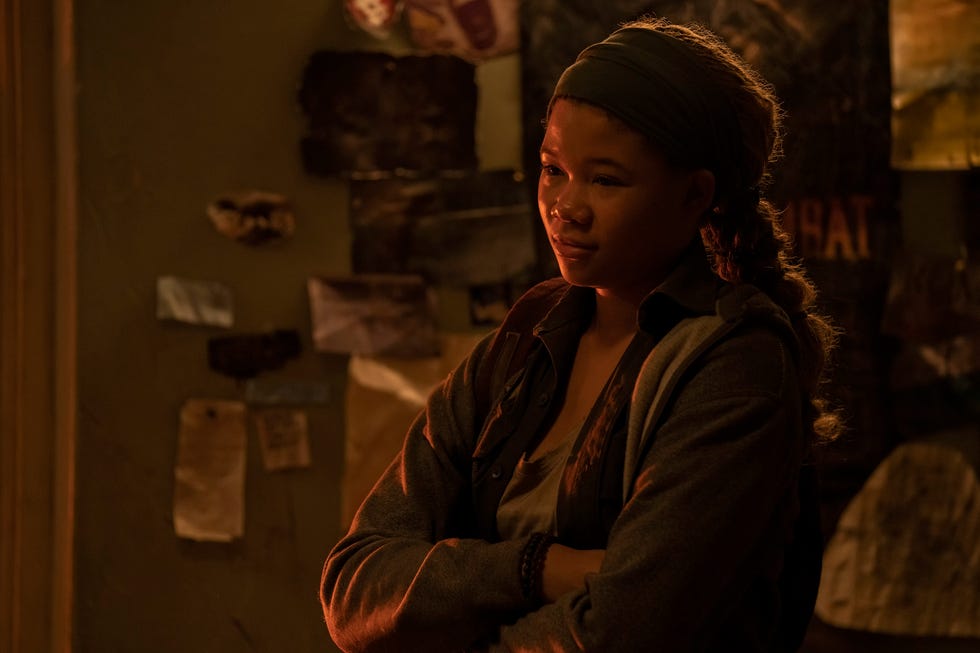Spoilers ahead for episode 7 of The Last of Us.
There’s a point at which, in the 2014 PlayStation game expansion The Last of Us: Left Behind, 14-year-old Ellie Williams takes a fall. She’s sprinting to escape the infected runners on her heels, but the scaffolding she’s climbed isn’t stable enough to support her weight; the structure leans, then tumbles. She drops with it, hitting the ground hard enough to knock the air from her lungs. The zombies are on her in an instant, and she screams for her best friend, Riley.
If you’ve watched tonight’s episode of HBO’s The Last of Us, you already know how this story ends. Ellie and Riley both wind up with war wounds from their zombie battle, which—in the cordyceps-infected world they inhabit—means certain death for their minds and, eventually, their bodies. I watched this PlayStation scene again recently and was struck by a YouTube comment left by another viewer: “Imagine if Ellie never fell off that railing in the last part. She would have never gotten bitten, so she wouldn’t have met Joel … Woah, this one small moment set the entire story forward.”
Episode 7 is grounded, in almost every scene, by similar acts of imagination. When Riley (Storm Reid) drops into her bedroom unannounced, Ellie (Bella Ramsey) is furious enough at her former roommate’s disappearance that she spends many of the remaining scenes questioning Riley’s devotion to a dream. At 16 years old, Riley has recently taken up with the Fireflies, a group of revolutionaries intent on overthrowing the fascist government that deploys FEDRA, the Federal Disaster Response Agency, which in turn controls the major quarantine zones across the country. Ellie thinks Riley’s idea of a better world—one run by these protestors—is a fantasy, and a dangerous one. As Riley coaxes Ellie into the night, the two sip from a whiskey bottle, debate politics, and trade “bullshit propaganda”: Riley is intent on visualizing radical change, no matter what it requires; Ellie digs her heels in, sure that the best path forward is to climb the FEDRA ladder and change the corrupt system from within.
In the abandoned shopping mall where Riley brings Ellie by way of late-night adventure and going-away party, the two get to visualize an alternative childhood, one where their teenage years took place before the outbreak. They ride escalators and carousels; they sneak pulls of bad booze; they stare, puzzled, at lingerie; they play old arcade games; they giggle at Ellie’s infamous book of puns; they trade secret, longing glances. They argue, Ellie hurt that Riley is leaving her to fight for a cause “I don’t even think you understand,” and Riley frustrated that Ellie can’t seem to understand it.
Ellie then discovers the homemade bombs in Riley’s food-court-turned-camp, and her disappointment is visceral enough to prompt Riley to reveal the truth: The Fireflies are asking her to leave town. This night is the roommates’ last together.
Underneath the flickering neon signs, Ellie confronts her friend: “Why did you bring me here?”
“Because I wanted to see you,” Riley says.
“And?” Ellie adds, her eyes scanning Riley’s face with a sort of wild, desperate hope. After watching the way she interacts with Riley—the bashful smiles, the handholding, the prolonged looks—we know what she’s wanting to hear. But how can she allow herself to admit it? Even at this point in the story, weeks before she meets Joel, Tess, or Sam, Ellie has endured so much loss, so much disappointment. Who can blame her for keeping her dreams small?
“And I wanted to say goodbye,” Riley finishes. This is all the confirmation Ellie needs. She whirls around and storms off, only returning to Riley’s side when she fears the Firefly recruit is under attack from infected. In actuality, the screams are coming from cheap Halloween decor in pursuit of a good jump-scare. Ellie’s blood pressure spikes once again, but this time the look on Riley’s face convinces her it’s time to listen.
“You don’t know what it was like to have a family, to belong,” Riley explains to her. “I belonged to them. And I want that again. Maybe the Fireflies aren’t what I think they are, but they chose me. I matter to them.” The line is intentional foreshadowing of Ellie’s own eventual encounter with Joel. He, too, perhaps isn’t who Ellie thinks he is. But he wants to take care of her. In his way, he chose her. That’s something she’s never allowed herself to imagine for herself before. Except, of course, when it came to Riley.
Outfitted in what I suspect must be disgusting-smelling monster masks, they twirl on the glass countertops of Spirit Halloween, swinging their arms to the rhythm of “I Got You Babe” by Etta James. But the verve only lasts long enough for Ellie to slowly remove her werewolf face and stare at her friend, her hair wild, eyes enormous and searching. “Don’t go,” she pleads.
Riley, finally, is convinced. “Okay,” she says, and Ellie lurches forward for a kiss. It lasts only a moment, but it’s convincing enough to send the two into fits of nervous laughter, as they realize—with a surge of joy—that the feelings between them are shared. There’s a future here, a real one. They can picture it. They can face it together. But as with so many moments in The Last of Us, the happiness is ripped from its source with a rush of brutality. A stalker, revealed to us earlier in the episode hibernating in the American Girl Doll store, leaps from under a stack of merchandise, and the friends are suddenly locked in a death match.
After a brief but heart-pounding struggle, Ellie secures her first kill, one she’s adrenaline-addled enough to practically celebrate when it crumples, hissing, to the floor. But the victory is short-lived, as every audience member will already recognize. Staring uncomprehendingly at the teeth marks on her arm, she claws at the stream of blood as if she could erase it.
When Riley reveals a matching chomp on her hand, Ellie’s rage is doubled. She shrieks, already incandescent with grief, slamming a bat through the Spirit Halloween display cases and spraying glass upon Riley’s feet. Resolute through her tears, Riley presents her best friend with two options: 1) They shoot themselves before the infection can take root in their brains. 2) They wait together, clinging to every remaining second of the future that, only moments prior, they thought could be real.
And this is the ultimate act of imagination: Riley believing that what remains of their humanity is worth fighting for. It’s this choice that saves Ellie, who otherwise might have died before she could discover her own immunity.
The scene ends with the two wrapped tight in each other’s arms, weeping but united. We don’t get to witness what happens to Riley, though we can take an educated guess. The most likely scenario is Riley turned into an infected, forcing Ellie—somehow, impossibly, still human—to flee from her friend or kill her. Showrunners Craig Mazin and Neil Druckmann purposefully leave that question unaddressed and unanswered, pinpointing the theme of the entire episode arc. We don’t need to know; we can imagine.
And if we can envision the horror of what Ellie endured, we can similarly understand the mission that drives her in the present timeline. Riley’s cause has become Ellie’s own. She, too, seeks the Fireflies, though not to overthrow FEDRA but to eliminate the need for it altogether. She is driven by the belief—however unlikely, however idealistic—that she can actually save the people she loves. That vision in her mind only crystallizes further as she endures the additional losses of Tess, Sam, and Henry.
So when we watch Ellie with a now-injured Joel, we can understand why she’s desperate enough to trust her own shaking hands. She grits her teeth as she threads a needle, pushing it through the puckered flesh of Joel’s stab wound. She has to believe she can save his life. She has to believe all this loss will amount to something worthwhile. She has to imagine she’s the cure, that the world Riley wanted can exist, that Joel can help her make it a reality. And maybe, at the end of it all, he can be beside her when that hope becomes something tangible. There, together, they might actually belong.
Culture Writer
Lauren Puckett-Pope is a staff culture writer at ELLE, where she primarily covers film, television and books. She was previously an associate editor at ELLE.

